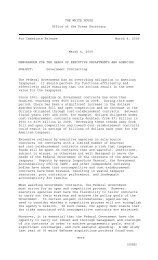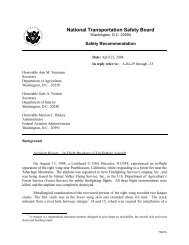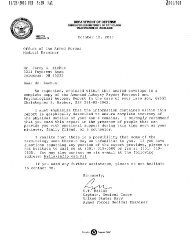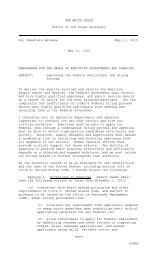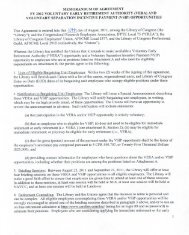Report - Government Executive
Report - Government Executive
Report - Government Executive
Create successful ePaper yourself
Turn your PDF publications into a flip-book with our unique Google optimized e-Paper software.
NATIONAL DEFENSE AUTHORIZATION ACT OF 2010<br />
The strong level of <strong>Executive</strong> and Legislative Branch support for creation of performance-based<br />
compensation systems has weakened since 2003. Both MAX HR and NSPS were controversial<br />
from their inception and the targets of litigation from employee unions. Reacting to the<br />
resistance of their federal employee constituents to performance-based compensation design and<br />
implementation, Members of Congress initiated agency inquiries and frequent committee<br />
hearings.<br />
As a further sign of the flagging political support for such systems, now-President Barack<br />
Obama wrote to the President of the American Federation of <strong>Government</strong> Employees during the<br />
closing weeks of the 2008 presidential campaign to express his priorities on federal workforce<br />
issues:<br />
….DoD has stated that it will implement final regulations on…(NSPS) in<br />
October. I agree with you that it is inappropriate and unwise for DoD to<br />
implement such a highly contentious, ill-conceived program so late in this<br />
administration, particularly following the vast revisions to the program included<br />
in the FY08…(NDAA). It is clear to me that the intention of Congress was to<br />
reinstate collective bargaining. Yet DoD is still moving forward with a personnel<br />
system that prohibits most collective bargaining.<br />
Based on my conversations with DoD civilian employees, I have several concerns<br />
about the NSPS pay system, including the aforementioned restrictions on<br />
bargaining rights, the disconnection between pay and performance despite what<br />
employees have been told, the requirement that performance ratings be pushed<br />
into a forced distribution, or bell curve, the suppression of wages by permitting<br />
bonuses to be paid instead of base salary increases, and the virtual elimination of<br />
merit consideration in the promotion process.<br />
Further, the class action lawsuits alleging race, gender, and age bias by employees<br />
placed under pay systems similar to NSPS in other agencies should give us pause.<br />
I cannot and will not support a pay system which discriminates against<br />
employees, and I cannot and will not support a pay system which ultimately is<br />
designed to suppress wages for civilian DoD employees over time.<br />
In March 2009, DoD suspended conversion of new DoD elements into NSPS pending the<br />
Defense Business Board review described earlier. In April, eight House chairmen and<br />
subcommittee chairmen sent a letter to the U.S. Office of Management and Budget urging the<br />
Obama Administration to suspend any further government-wide implementation of performancebased<br />
compensation. Subsequently, the Conference <strong>Report</strong> for the Fiscal Year 2010 National<br />
Defense Authorization Act (NDAA) “repeal(ed) the authority for the National Security<br />
Personnel System (NSPS) and require(d) the transition of NSPS employees to previously<br />
existing civilian personnel systems…”<br />
19





